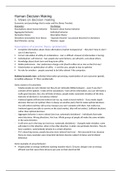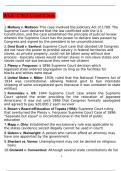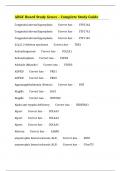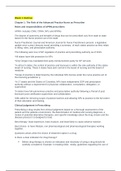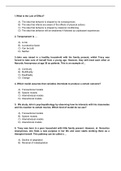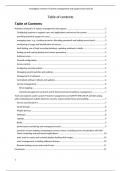1. Views on decision making
Economics and psychology that is water and fire (Amos Tversky):
Economics Psychology
Assumptions about human behavior Research about human behavior
Aggregated behavior Individual behavior
Normative theory Descriptive theory
Deviations (anomalies) from theory ‘Separate theories’ (occasional theories) for deviations
Exact theories, wrong Theories, vague
Assumptions of economic theory (problematic)
Complete information about choice alternatives (market transparency) – they don’t have it, don’t
use it if they have it.
Correct calculation of utility of combinations – but, is difficult. Amount of information is too big.
Individualism, self-interest – but, people also want fairness, are altruistic, care about others.
Knowledge about short-term and long-term utility
Stable preferences – but, preferences change a lot (fourth coffee not as nice as the first one)
Maximisation or optimisation of utility – is not the case, people to lazy to optimise
No role for emotion – people assumed to be fully rational / like computers
Rational economic man: unlimited information processing, maximization of own outcomes (greed),
incredible willpower This is problematic.
Some answers of economists:
- Maybe people are not rational, but they do act rationally (billiard players) – even if you don’t
consider all the options / make all the calculations / have all the information, you can still make a
really good decision. But, also all kinds of biases, people make systematic mistakes all the time.
Outcome of decisions is not always rational.
- Irrational agents will become extinct (not rue, eg. trade at stock market) – If you make stupid
decisions that are not optimal, there is always an another party that do make optimal decisions.
You will extinct and they will survive, because you can’t compete with them. Not really true.
Irrational agents are able to survive on the stock market, they will not extinct. Sufficient decisions
rather than optimal decisions.
- Aggregate behavior is more rational (not true, systematic deviations) – individuals that make
weird decisions. Wrong directions. Not true. Whole groups of people all make the same mistake
in the same direction.
- It will even out in the long run (not true, systematic deviations) – If people make mistakes, some
will make it in this direction, other in the other direction. In data: one particular direction. They do
have a pattern, systemetically deviate in a certain direction.
- If it’s about big money, people become more rational (not true) – Not necessarily true, because
there are many examples were important decisions became subject to biases and irrational
behaviour.
Some examples of actual behavior:
People prefer an energy inefficient washing machine that is 50 euros cheaper over an energy
efficient one that saves them 60 euros per year on their electrical bill

